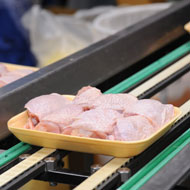
Findings spark fresh concerns over safety of US meat
A collaborative investigation by the Bureau of Investigative Journalism and the Guardian has revealed thousands of hygiene violations in US meat production.
The violations, revealed in unpublished US documents, include dirty chicken, diseased poultry meat and pig carcasses piling up on the factory floor. They also include meat destined for the human food chain riddled with faecal matter and factory floors flooded with dirty water.
The findings follow a row over chlorinated chicken, which sparked fears the UK could be open to such practices if food safety standards are lowered after Brexit. Commenting on the recent findings, MPs and food safety experts said that the violations highlight the risks to consumers, both in the US and the UK.
“These figures are sobering reminders of the risks to UK public health if the UK crashes out of the EU’s food safety regime into the arms of Uncle Sam,” said Tim Lang, professor of food policy at London’s City University. “British consumers must not be tantalised by offers of notionally cheaper US or international meat. Cheap meat isn’t cheap. The lamentable figures in this study remind us that big plants generate big problems when they go wrong.”
Labour MP Kerry McCarthy called for urgent reassurances from both the UK’s Food Standards Agency (FSA) and leading figures in government so that standards would not be allowed to fall as trade negotiations get underway.
“We cannot allow this to be a race to the bottom. We should insist the US raises its standards and guarantees food safety before we are prepared to allow in US meat imports,” she said.
The investigation analysed hundreds of pages of unpublished documents containing information about violations at plants operated by Pilgrim’s Pride. The company is one of the USA’s biggest chicken producers, with the capacity to process more than 34 million birds per week.
JBS, which owns Pilgrim's Pride, responded to the investigation saying that all of the incidents highlighted at their plants were "immediately addressed" and consumers were never put at risk.
“The U.S. meat and poultry sector is one of the most highly regulated industries in America”, said Al Almanza, JBS’s global head of food safety and quality assurance. “Non-compliance reports are issued by USDA inspection personnel to document when an establishment has not met a specific regulatory requirement. However, the vast majority of non-compliance issues are addressed immediately and have no impact on food safety.”



 The Veterinary Medicines Directorate (VMD) is inviting applications from veterinary students to attend a one-week extramural studies (EMS) placement in July 2026.
The Veterinary Medicines Directorate (VMD) is inviting applications from veterinary students to attend a one-week extramural studies (EMS) placement in July 2026.